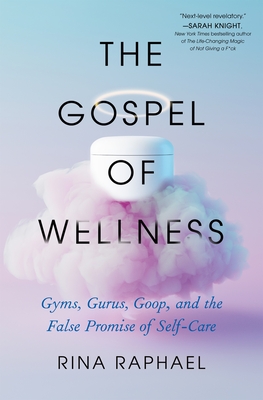This review contains affiliate links, which earn me a small commission when you click and purchase, at no extra cost to you. Thank you for supporting my small business and allowing me to continue providing you a reliable resource for clean book ratings.
“Wellness” is quite a buzzword today. What makes it particularly useful is that it has a pretty hazy definition. But, no matter: everyone is in pursuit of it. It’s fueling a $4 trillion industry that includes weight loss, youthful appearance, vitality, calmness and happiness, and all-round “success.” It’s intertwined with another popular buzzword: “self-care.” If we (frankly, mainly women) simply take good enough care of ourselves, we will be thin, beautiful, young-looking, happy and successful.
Rina Raphael maintains that this pursuit of wellness has become a kind of modern-day religion. It has many familiar hallmarks: self-denial, devotion, a place to congregate or at least a group of fellow followers to bond with, charismatic leaders. And with life feeling increasingly chaotic and impossible to manage, the types of practices and products for sale offer women the feeling that they can potentially regain some control.
Raphael explores specialty gyms, products of all sorts, diets and cleanses, crystals, and groups that claim to know what’s dangerous (and, conversely, safe) to put in and on our bodies. Many are just as silly and scientifically unfounded as any snake oil treatments from a century ago. They not only part middle- and upper-class people with large sums of cash, but they sometimes do actual harm. And the harm part is particularly true when it comes to how these groups or movements affect lower-income people.
“Because of our current nutrition discourse, those without the means or time to devote to an all-encompassing clean/organic/‘superfood’ lifestyle believe healthy living remains unattainable,” Raphael writes. It’s bad enough that many lower-income consumers live in food deserts. But those who do have access to produce may avoid it because they’re “nervous and confused about pesticides and too cash-strapped to afford organic.”
Others may avoid or delay healthy movement because of feeling intimidated by “fitspo.” The author notes, importantly, that fitness influencers share what they eat and how they work out to show how followers can look like them. But they conveniently leave out that “bodies react differently to specific exercises: genetic diversity cannot guarantee exact results.” And all this fitness (and “clean eating”) imagery isn’t motivating average Americans. “On the contrary, it’s intimidating them to the point of quitting before even starting.”
What’s also important to remember is that fitness doesn’t equal health, nor does health or wellness look a certain way. While influencers and this trillion-dollar industry are pushing and selling “wellness,” what they’re really trying to sell is a desirable appearance. And no one can guarantee that. (Nor health.)
Back to Raphael’s message that wellness is the new religion: “Almost every wellness brand sells some sort of mythical state of bliss on Instagram, their preferred playground. Their sales pitch is less about health benefits and more about something stronger: a feeling. It’s about feeling good, feeling in control, feeling attractive. Brands are counting on you buying a fantasy.”
She concludes by saying that it’s (obviously) good to pursue healthy habits. But the “pseudoscience, hyperconsumerist ethos is muddying the waters…. The religious treatment of wellness might also be because we’ve made it harder for people to find aspects of a fulfilling life in modern society.” What we need to do is truly find meaning and support others in that as well.
To benefit everyone’s true wellness/health, “we need systemic solutions and public infrastructure. We need more medical research, improved doctor-patient relationships, policies to support women, and better consumer product regulatory oversight. We need stronger communities.”
The Gospel of Wellness is one among a number of new books about health and the pursuit of it, and it does a good job of it. I’ll probably find myself reading a few more as well. It’s time for some sane thinking to prevail in what’s become an insane landscape.
Rated: Moderate. Profanity includes 3 uses of strong language, about a dozen instances of moderate profanity, 15 uses of mild language, and one use of the name of Deity in vain.
*I received an ARC in exchange for my honest review.




